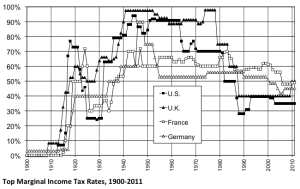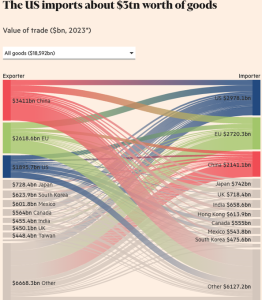
Top Tax Rates
—And thus, inability to run the state.
In the modern world this causes a great deal of confusion. I guarantee some MMT follower is gleefully planning a comment saying “a state’s ability to spend is not based on taxation.”
Technically true, practically false. A state which uses its own currency can always, in theory, print money.
But taxation is best understood more primaly than “the people send us money, we spend it.” Rather it is the amount of the economy which the government can control.
Every country has an economy. The economy is what the people of the nation actually do. Dig stuff up, refine stuff, grow stuff, manufacture, stuff, take money from idiots as consultants, waste everyone’s time with advertisements, destroy the digital commons, and so on.
Near adjacent to the economy is what it could do if we wanted it to, because we know how to do whatever it is and we can easily get the resources: so we could easily build more homes, for example, or train more doctors or nurses, or hire more Professors or build out more solar power and so on.
 The final part of the economy is what you can get from other nations. Call this the external economy. Does someone else make it, will they sell it to you, can you afford it? Most of the time countries won’t sell other countries nukes, for example, and for much of history countries tried not to sell other countries the knowledge required to make advanced techs. When they didn’t prevent this, they paid big time: Britain was de-facto subjugated by America and America is now losing its Empire.
The final part of the economy is what you can get from other nations. Call this the external economy. Does someone else make it, will they sell it to you, can you afford it? Most of the time countries won’t sell other countries nukes, for example, and for much of history countries tried not to sell other countries the knowledge required to make advanced techs. When they didn’t prevent this, they paid big time: Britain was de-facto subjugated by America and America is now losing its Empire.
This is why being the richest King in Africa in 1850, even if you had been richer than England, would have done you very little good. You could not buy what you needed: industry, and even if you could buy a few weapons and machines you couldn’t maintain and repair them.
Taxation is the ability to command the resources of other people. That is all it is.
Now, in the US and the West generally, since some point in the sixties, the state has been increasingly losing the ability to tax the rich. The rich insist on controlling more of the nation’s wealth and economic activity and every decade they have increased that control. Every time something is privatized, that’s the state losing power to tax—to control a piece of the economy. Every tax decrease on the rich is, obviously, a reduction in ability to tax the rich.
The amount of control the State has has been reduced, and amount of control the rich have has been increased. This is an effective loss of the ability to tax.
What is happening right now is that the US is losing the ability to tax the rest of the world. Dollar privilege was “we’ll take American money and make what Americans want for them.” It was the ability of America to direct other people’s economies to do what America wanted. The vast power this implies is mind-boggling.
It is that ability to control other nations’ economies which made the US an Empire, even if it directly militarily occupied few countries. It didn’t need to. It could still tell them what to do.
Since the US didn’t need to make and dig everything, it didn’t: it just made everyone else do that. This was, in many ways a bad idea, but it did mean that the US got the benefits of industry without a lot of the downsides.
So, since JFK and especially since Carter/Reagan, the US has been losing its ability to tax the rich. It has increasingly chosen to tax the rest of the world, moving industry, in particular, to other countries. Those countries made what the US needed, and sold it to them in US dollars, of which they were willing to accept nearly infinite amounts even though, in most cases, they didn’t need nearly as much from the US as the US did from them. (What they did need, in the early and middle years, was capital goods and knowledge, almost infinitely precious, though. Now with China leading in 80% of fields, well, not so much.)
Right now a huge tax cut for the rich is being paid for by cutting 800 billion from Medicaid, even as DOGE savagely cuts a federal civil service which has not grown in nominal numbers in sixty years, and thus has really already been contracting. State capacity is being savaged and services and jobs are being removed from the lower and middle classes.
Now let’s bring this back to the original topic: revolutions happen when states can’t command enough of the internal or external economy. It does not matter how much you can print or tax in nominal terms. In the Weimar Republic people would take a wheelbarrow full of cash to the store: all that matters is what you can actually command/buy with the money. For a long time the US dollar could buy pretty much anything.
But what happens when it doesn’t? What happens when you give it to cops and bureaucrats and soldiers and brown shirts like ICE and it doesn’t buy what they need, or even what they want?

